#eliza bennet
Explore tagged Tumblr posts
Text
#pride and prejudice#jane bennet#mary bennet#lydia bennet#elizabeth bennet#eliza bennet#lizzie bennet#bennet sisters#jane austen
13 notes
·
View notes
Text
The Darcy Family Album: Volume X
Still with the Darcys today (I had a lot of catching up to do with them), and it's time for a birthday get-together!

Eliza has invited her sister Martha, who has brought her sometime-boyfriend James with her. No one invited Grace the Stroppy Stray - she just showed up of her own accord.

That greeting kiss seems to have sealed the deal for James!

Grandma Mary is also here, eschewing her reclusive lifestyle for once.

Thanks to granddad Fitzwilliam's dedication to the cause - despite his creaking back - Agnes masters walking, just in time!

Aunt Georgiana is also here, and bizarrely, James has decided that she is the girl for him too! (Although they do have a history.)
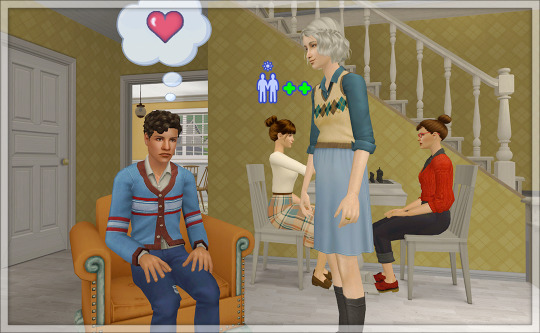
While he reflects rather soberly on the unexpected turns that his love life has taken within the space of only an hour, his two paramours (not forgetting Olivia and Henrietta too) settle down together for a friendly game of chess.
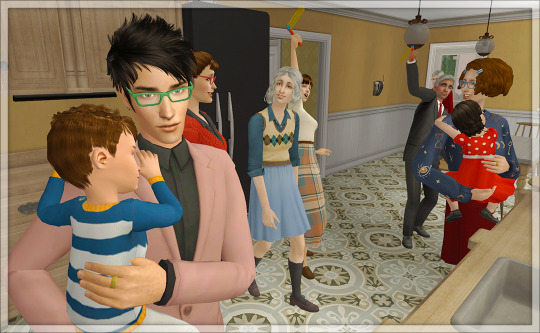
Frankly, it's all a bit of a relief when the time comes to blow out some candles!

Younger twin Agnes actually goes first.
~ Scorpio 8 / 5 / 10 / 1 / 2
~ Adventurous / Grumpy / No Sense of Humour
~ OTH: Games
~ Favourite Colour(s): Lilac

And then Lewis is up.
~ Scorpio 10 / 5 / 4 / 2 / 7
~ Bookworm / Perfectionist / No Sense of Humour
~ OTH: Science
~ Favourite Colour(s): Olive Green Well, it seems that one of the few things they share - other than a birthday - is a humourless disposition!

Isabel would like everyone to know that she is there too!

Some angry washing up from Lewis.

Beat it, kid.

So he does - and goes to play with his little sister.

Knowing that her grandma is some kind of alienologist, Agnes is keen to find out whether they really have ray guns?

No, Georgiana! I'm with Martha - not best pleased at all with this romantic development! (Although how she can see what's going on from around a corner, I do not know.)
#sims 2#gameplay#merybury#fitzwilliam darcy#eliza bennet#lewis darcy#agnes darcy#isabel darcy#martha knightley#james morland#mary bennet#georgiana darcy#olivia elton#henrietta wentworth#grace the stroppy stray#darcy family
22 notes
·
View notes
Text
This white cream color dress with embroidery on is worn on Lily Sacofsky as Clara Brereton in Sanditon Season 2 Episode 6 (2022) and later worn on Eliza Bennet as cousin Harriet in An American In Austen (2024)


#recycled costumes#sanditon#lily sacofsky#clara brereton#an american in austen#eliza bennet#cousin harriet#costume drama#period drama#period dramas#perioddramasource#reused costume#reused costumes#dramasource#jane austen#drama series#source: historicalreusedcostumes
10 notes
·
View notes
Text
In preparation for shortly going to see a talk about Jane Austen by historian Lucy Worsley, I finally finished her book Jane Austen at Home (it had been sitting on my shelf for months, I'm a terrible procrastinator).
Overall, I did enjoy the book. I thought that looking at Jane Austen through the lens of the various places she called home over the years and how they shaped her writing was definitely an interesting approach. Though I can't say I learned anything of significance that I didn't already know about her life, it's well-written and researched and I would recommend it if you are not so knowledgeable about her life and wish to discover more.
But I recommend it more for the historical context than the literary analysis as, although it was evident that she is hugely passionate about Jane Austen, her novels and her life, unfortunately, there was a moment where Worsley slipped into that frustratingly all too common trope found in biographies of Jane Austen. Where authors are desperate to prove that AcTuALLy, they, and they alone, truly understand her novels and everyone else has been reading them wrong all along!
I have no idea why so many of those who write about Austen have a tendency to slip into this, is it born out of sheer desperation to prove that they're actually The Biggest Janeite and that the other countless readers who have enjoyed her novels, over the course of more than two centuries, are actually idiots?
Chapter 25 of Jane Austen at Home concluded with the argument that, because the novels tend not to dwell on the so-called "most romantic" scenes (such as where the hero and heroine finally get engaged) taken in combination with the fact that Jane Austen often wrote letters with double meanings (often sarcastic remarks about relatives/friends) that contained passages that would not be picked up on by inattentive listeners upon a first reading aloud, but that later those who were closest to her (such as her sister, Cassandra) would understand, means that, if you want to, you can find evidence that Jane Austen didn't write happy endings for her heroines, actually, and was secretly undermining the institution of marriage!!
Personally, I think that Austen wanted her readers to use their imaginations and had laid the foundations well enough already in the hundreds of pages prior to these moments to convince the audience that, actually, marriage to their respective heroes was a good and positive step for all of the heroines who we've already grown so fond of.
It was a pretty egregious passage on the whole, but perhaps the worst part, to me, was the quotes selected from Pride and Prejudice.
Brace yourselves...
People who see some merit in this argument perhaps don't believe in love and marriage and happy endings more generally, for in Jane Austen's work you find, above all, what you seek. It holds as many different meanings as there are readers. So what is it that these sceptical readers might spot? Lizzy Bennet only marries Mr Darcy with 'uncomfortable feelings' about their differing rank, which 'took from the season of courtship much of its pleasure'.
I audibly gasped. The sentence itself is a little confusing, as I'm still not sure who allegedly has those uncomfortable feelings? Regardless of whether the argument is for Elizabeth or Mr Darcy, I certainly did not recall either of them expressing such sentiments at the end of the story.
So, naturally I went to the novel and this is the passage, right at the end of Chapter 61 which Worsley very selectively quoted from:
Mrs. Phillips’s vulgarity was another, and perhaps a greater, tax on [Darcy's] forbearance; and though Mrs. Phillips, as well as her sister, stood in too much awe of him to speak with the familiarity which Bingley’s good humour encouraged, yet, whenever she did speak, she must be vulgar. Nor was her respect for him, though it made her more quiet, at all likely to make her more elegant. Elizabeth did all she could to shield him from the frequent notice of either, and was ever anxious to keep him to herself, and to those of her family with whom he might converse without mortification; and though the uncomfortable feelings arising from all this took from the season of courtship much of its pleasure, it added to the hope of the future; and she looked forward with delight to the time when they should be removed from society so little pleasing to either, to all the comfort and elegance of their family party at Pemberley.
The meaning of this passage is to illustrate that, despite a much-reformed Darcy trying his best, even still, there was only so much he could (understandably) take in Meryton before his patience was exhausted due to the vulgarity of Elizabeth's relations. Though he wasn't rude anymore and made an effort with them, he still wasn't exactly comfortable in the company of the Bennets and their relations. Elizabeth understood this, and did everything she could to keep him happy as she accepted that her family could be A Lot too and she knew that he was trying his best to be civil in company with them.
I mean, that's not subtext, it's RIGHT THERE. We are told that the society of Meryton is 'so little pleasing to either,' that both Darcy and Elizabeth cannot wait to retreat to Pemberley. See, they both feel the same. This is no longer a case of Mr Darcy being a snob and Elizabeth feeling desperate to rush him off before he realises 'their differing rank,' as Worsley puts it, will prevent a happy marriage and is tempted to call off the wedding entirely. No, both went into the marriage with their eyes wide open.
Plus, both Darcy and Elizabeth have already overcome 'their differing rank.' It's such a ludicrous argument. Is Worsley seriously contending that the woman who boldly said to Lady Catherine de Bourgh, in the face of overwhelming snobbery and personal attacks,
'in marrying your nephew, I should not consider myself as quitting that sphere. He is a gentleman; I am a gentleman’s daughter; so far we are equal,'
would retain any 'uncomfortable feelings' about her upcoming union to a man of Mr Darcy's standing? The woman who views herself as his equal? I don't buy it.
Likewise, Darcy does get along with some of Elizabeth's relations. It's shown that he does find Mr and Mrs Gardiner in particular to be good company. That is the last line of the entire novel. And let's not insult Elizabeth Bennet's intelligence! She would not have accepted him if she truly believed Darcy was still a snob who thought himself so much her superior.
Anyway, if this argument wasn't already weak enough, due to Worsley's selectiveness when quoting from the novel (conveniently she leaves out the end of the 'season of courtship' quote; that, while it may have lacked some pleasure, 'it added to the hope of the future' i.e. that though being in company with her relatives during her courtship wasn't always pleasant, Elizabeth had seen enough of Darcy's altered manners to know that she'd be happy with him) and the fact that when she does quote from the novel, she uses them completely out of context in a weak attempt to back up her points, it is the conclusion is perhaps most unconvincing of all:
But if you follow me this far in the idea that Jane was undermining the very moment where you'd expect marriage to be most praised, there could be an explanation. The same applies to her novels. At first reading, these are stories about love and marriage and the conventional heterosexual happily-ever-after. Only at the second does a sneaky doubt perhaps creep in to suggest that maybe marriage is not the best thing that could ever happen to these women.
What?! Seriously, if you have a 'sneaky doubt' that any of the heroines and heroes would not lead happy lives together, you need to reread the novels! All six are dedicated to showing us why these two people are compatible with each other, and truly love and respect each other in ways that go deeper than any superficial attraction.
More to the point with Pride and Prejudice, I think that any remaining unmarried sisters, upon Mr Bennet's demise, who ended up as spinsters entirely dependant on other men, would maybe have been 'not the best thing that could ever happen' to the Bennet sisters, to say the least.
So, not only is this passage astonishingly poor literary analysis, it's also baffling that an experienced historian would make such an argument... given the historical context of how vital it was for women to marry for financial considerations just as much as romantic reasons.
Ultimately, and although this quote which I'm about to use can be used in the worst context sometimes, especially from thoroughly pretentious individuals, it's still worth concluding with. Jane Austen wrote in a letter to her sister Cassandra, shortly after the publication of Pride and Prejudice:
There are a few Typical errors – & a 'said he' or a 'said she' would sometimes make the Dialogue more immediately clear – but 'I do not write for such dull elves As have not a great deal of ingenuity themselves.' [The 'dull elves' quote is not originally from Austen, rather she quotes from Marmion by Sir Walter Scott]
Which to me, shows that Jane Austen clearly believed that she did not need to spell everything out for her audience. That we are capable of filling in the gaps for ourselves and that we can understand, thanks to the context of all that has preceded it, that although we do not get to see really anything of the Darcys married life, that they certainly would have been very happy together.
And, most importantly, we can easily understand that Elizabeth did get her happily-ever-after at Pemberley with Mr Darcy. There is no secret other interpretation that needs to be made which claims otherwise.
#jane austen#jane austen at home#pride and prejudice#cassandra austen#elizabeth bennet#mr darcy#fitzwilliam darcy#my analysis#lucy worsley#there was also a heinous quote about mansfield park and emma which completely misunderstood those novels too#but when i say writing this took my last braincell for the week i TRUUUULY mean it. don't have the capacity to scrutinise that too rn#i am so disappointed in this section ugh. other than this awful argument it was genuinely enjoyable#the ending even made me a bit emotional#but i just expected better#why do all austen scholars do this. you are not going to uncover anything new i promise and that's fine#it doesn't mean you're a failure#but if there was some new way of reading the novels it would have been done by now#cora reads#also from a HISTORIAN??/ pretty basic to know not to quote things out of context and not cherry pick sources to back your points up#the other minor gripe was that she kept referring to elizabeth throughout the whole text as 'lizzy bennet'#which... with interpretations like that.. sorry ms worsley you're not close enough to use her nickname#source: me#but also she's either just lizzy or eliza or elizabeth but she's ALWAYS elizabeth bennet.. . ... lizzy bennet looks so wrong to my eyes lo#anyway still excited for the talk. it'll be nice to be surrounded by fellow jane austen enthusiasts irl instead of on a screen lol
24 notes
·
View notes
Text
Whoever casted Pride and Prejudice (2005) needs to cast every book adapted movie from now on because everyone was PERFECT
#pride and prejudice#pride and prejudice 2005#pride & prejudice#elizabeth bennet#lizzie bennet#eliza bennett#mr darcy#fitzwilliam darcy#matthew macfayden#kiera knightley
18 notes
·
View notes
Text
people who call Elizabeth Bennet “Lizzy” are my favorite people
#something about being on first name terms with classic lit characters#pride and prejudice#elizabeth bennet#lizzy bennet#classic literature#jane austen#personally I call her eliza a lot but I digress
188 notes
·
View notes
Text
when is it inkhearts turn to be rebooted into a 6 episode tv show thats cancelled after 1 or 3 seasons smh
#they should still cast brendan fraser and paul bettany as mo and dustfinger tho#hell bring back eliza bennet too. cast her violante lmao#inkheart
12 notes
·
View notes
Text








Mr. Darcy is the original Depressed Elf Nightmare Man
#pride and prejudice1995#pride and prejudice#mr darcy#jane bennet#eliza bennett#elizabeth bennet#mr bingley
31 notes
·
View notes
Text
OK, I actually love that Eliza FINALLY learned how to cook bless you mr potts
bc it goes a small way in addressing the oft-used pitfall in historical dramas where depictions of headstrong, intelligent, capable women are unable OR unwilling to do traditionally 'feminine' things, seeing them as 'beneath' them/a waste of time-
even THO it's a basic life skill, not a gender role: cooking, laundry, sewing, washing dishes.
Another kudos for mr potts framing it in a way that is enticing and understandable for eliza: science and chemistry!
#id really like to make my tedtalk on how modern depictions of strong intelligent women in histoical dramas#often have them eschew typically feminine things like sewing embroidery and cooking#in favor of reading or science or cerebral activities#bc writers are like well its got to appeal to modern women#so of course that means no traditionally feminine or quiet things!#cough eloise from bridgerton#cough lizzie bennet tho i love her sigh#cough the most recent persuasion tho ive only seen the trailer lol#miss scarlet spoilers#miss scarlet#msatd#i think it also relates to the idea of weaponized incompetency#bc how many times has eliza said to ivy#oh but you do it so much better than me cant you do it#and then she sweeps out the door#and eliza often OFFERS to do laundry or cooking but with no intention of actuslly doing them#bc she KNOWS ivy will say you cant do it well and she does
13 notes
·
View notes
Text
The Knightley Family Album: Volume XVII

James is continuing to throw his heart and soul into establishing his new business, which includes keeping the place tidy.

It's good to get a bit of family support, when mum Jane shows up to see how things are going.


And his efforts are paying off!

It's all going so well that Martha has been drafted in to help out on the till - it's becoming a family concern.

And the (cute) Reporter likes the shop so much, she comes back the next day.

The true mark of a good salesman is being able to sell a pet bed to someone who doesn't even have a pet.

No wonder stock is flying off the shelves.

Perhaps someone should tell Eliza that her husband bought the same aquarium already...

Becoming a self-made man doesn't allow much time for domestic concerns, but worryingly, James seems to be concerning himself more with old flame Georgiana - when she just happens to drop round - than with his own fiancée!
(And with that, my gameplay screenshot reserve is exhausted! Expect something slightly different next week...)
#sims 2#gameplay#merybury#knightley family#james morland#martha knightley#jane fairfax#eliza bennet#georgiana darcy
10 notes
·
View notes
Text

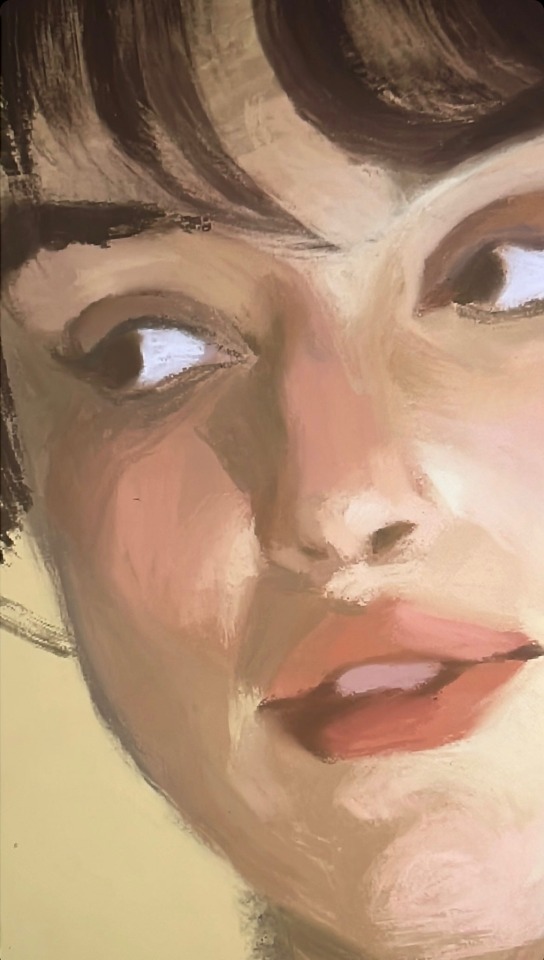

in keira knightley we trust 🫶
#keira knightley#pride and prejudice#elizabeth bennet#mr darcy#jane austen#art#portrait#eliza bennett
126 notes
·
View notes
Text
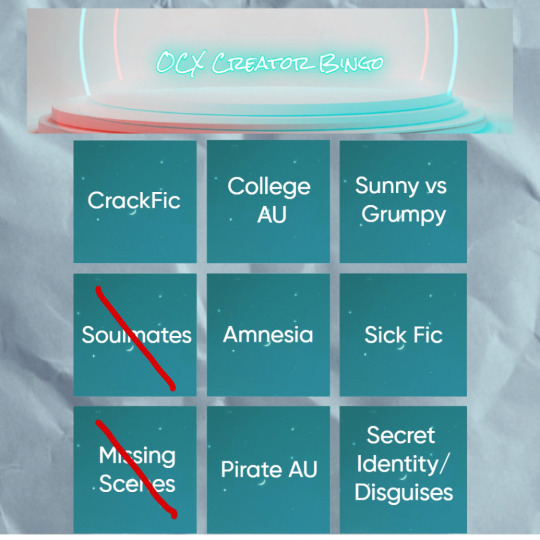
Fandom: The Flash
Characters: Morgan Wells (OC), Eobard Thawne/Harrison Wells (“Eowells”), Tina McGee, Eliza Harmon, James Bennet-Evans (OC), Caitlin Snow, Cisco Ramon
Pairings: Morgan & Thawne, Morgan & Tina, Eliza & Morgan, Caitlin & Morgan, Cisco & Morgan, Morgan/James
Summary:
“Soulmarks are merely an indicator of extra special people in your life...whether friend or lover or anything of the sort. But there's no obligation to act on them…and you can absolutely have close relationships with other people.”
“Do...do you have any?”
He smiled and showed her the one on his left shoulder: a cluster of stars with a golden aura. “It's why I call you Starlight, you know.”
She beamed.
Morgan's known about soulmarks nearly her whole life, and she's known just as long that one of them is her dad's. She should feel lucky, to know such a thing so early—parent-child soulmate matches aren't common and are often auspicious.
So why, instead, does she feel so uneasy?
As usual, thank you to the wonderful @occreatorexchange for hosting this 🥰 this was a fun AU to dip my toes into, and I hope to write more of it in the future!
Taglist (send an ask or DM to be added or removed):
@arrthurpendragon @ocappreciationtag @raith-way @vexic929 @ironverseocs
@thechaoticfanartist @goldheartedchaoticdisaster @negative-speedforce @starstruckpurpledragon @angst-is-love-angst-is-life
#happy crisis day! here’s a fic i managed to finish in time to post today 🥰#ocx prompt bingo#ocx creator bingo#oc creator exchange#prompt: soulmates#morgan wells au what-ifs#mw soulmates au#oc: morgan wells#eobard thawne#eowells#tina mcgee#eliza harmon#oc: james bennet evans#caitlin snow#cisco ramon#the flash
5 notes
·
View notes
Text
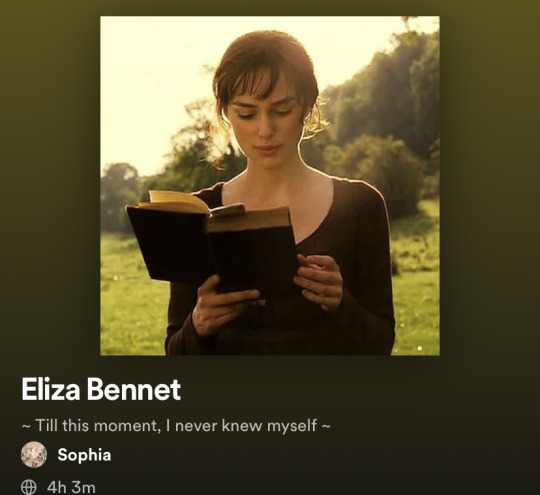



Pride & Prejudice Playlist
~ 🌹🫖📚🎀🐴 ~
#spotify#playlist#spotify playlist#book playlist#literature#classic literature#elizabeth bennet#eliza bennett#lizzie bennet#pride & prejudice#taylor swift#hozier#the mountain goats#death cab for cutie
4 notes
·
View notes
Text
statistical "which character" personality quiz
this is an interactive personality quiz that will match you to fictional characters from a large database based on similarity of description.

Pam Beesly (The Office): 89%
Anna Bates (Downton Abbey): 89%
Dorothy Gale (The Wizard of Oz): 89%
Hilda Spellman (Chilling Adventures of Sabrina): 89%
Rosalind Walker (Chilling Adventures of Sabrina): 89%
Charlie Bucket (Willy Wonka & the Chocolate Factory): 88%
Littlefoot (The Land Before Time): 88%
Samwise Gamgee (Lord of the Rings): 87%
Eliza Hamilton (Hamilton): 87%
Kara Danvers (Supergirl): 87%
Waverly Earp (Wynonna Earp): 87%
Annie January (The Boys): 87%
Anastasia Steele (Fifty Shades of Grey): 87%
Jane Bennet (Pride and Prejudice): 86%
Belle French (Once Upon a Time): 86%
Jess Day (New Girl): 84%
#anastasia steele took me tf out im crying#mad that adora isn't in their database bc that was her biggest inspo#kara danvers is super real tho - her and jane bennet and eliza hamilton#・゚ . 𝘐 𝘸𝘪𝘴𝘩 𝘮𝘺 𝘴𝘱𝘪𝘯𝘦 𝘸𝘦𝘳𝘦 𝘢 𝘴𝘸𝘰𝘳𝘥 𓆱 study.
2 notes
·
View notes
Text
Finished my re- reading of Pride and Prejudice and I absolutely adore the ending it's so sweet and satisfactory and something I want to mention that we've all talked about before is that obviously Eliza had kept so many things from her family (referring obviously to her love for Darcy but also how she GOT to that point in the first place) but something that I think is so funny is that even after she opens up to them about things there are still things they do not know. Most notably Darcy's first proposal.
Jane is the only one who knows and I'm just imagining her parents finding out.
Like imagine her parents visiting her as Misstress of Pemberley for the first time after their I'm sure LONG honeymoon and Mr. and Mrs. Bennet are admiring the estate telling Lizzy how lucky she is, and she inadvertently lets it slip like, "I know. I remember thinking how lucky I would be to live here after I rejected him the first time."
And her parents just halt you can hear a pin drop until her mother looks at her and is like, "What..."
And Elizabeth tries to play it cool by going, "Y - yeah, he proposed to me once before I accepted him. But we don't like to talk about it."
And her father quips, "Yeah, because I can imagine how seething u were in your rejection."
Eliza and her husband exchange a look, "N - no... no, I wouldn't say SEETHING... maybe... a little... impolite... right, Darcy?"
Eliza pleads with her eyes for him to help but unfortunately for her given their time together he has in FACT learned to laugh at himself and he knows he's going to pay for it dearly once the in-laws leave but he doesn't know when he will ever have the upper hand against his wife again so he smiles at her and she just knows what's coming
"I believe your exact words were, my darling," he begins slowly, "I was the last man in the world whom you would ever be prevailed upon to marry."
It takes Mr. Bennet to keep his wife from attempting to bludgeon their daughter to death, and you can see that while he's doing so he's trying to contain his own laughter and there may even be a gleam of pride in his eyes. Meanwhile Elizabeth's stare would be enough to eviscerate her newlywed husband however she knows she can't be too mad bc this is the monster she herself has created.
400 notes
·
View notes
Text
Jane Austen: Darcy, you see an older jolly-looking fellow coming in your direction-
Fitzwilliam Darcy: another one? Miss Bingley, please dance with me-again.
Caroline Bingley: *fake-swooning* oooh, Mr Darcy~again? what would the other guests say?
Charles Bingley: *heh* probably that he is kind of a prick? Or that you guys are an item.
Fitzwilliam Darcy: I have danced with Mrs Hurst too-I am still not romancing anyone.
Caroline Bingley: *sing-song voice* we will see about that!
Jane Austen: the poor guy remains in the middle of the room awkwardly, and then walks away; the older ladies that have introduced themselves as Mrs Bennet and Lady Lucas look at the scene and start whispering furiously-
Fitzwilliam Darcy: *rolling his eyes* I can only imagine what they are saying.
Charles Bingley: hey, can I guess what is the general opinion of us at this ball?
Jane Austen: sure, roll a Perception Check.
Charles Bingley: hah, I rolled a twelve!
Jane Austen: you are the man of the hour, and the ladies are very jealous that Miss Bennet has captivated your attention for so much time-
Charles Bingley: what can I say, she is a delight! Who could resist?
Jane Austen: you also feel that Caroline is very much admired for her elegance and style, as is Mrs Louisa Hurst-
Caroline Bingley: *fake hair toss* is anyone surprised?
Jane Austen: you see people looking in the direction of Mr Hurst at the buffet with a general air of ‘eh, he looks like a rich gentleman, I guess he is all right”.
Mr Hurst: hey, I am a gentleman and I am married-I won at this game already, let me eat the imaginary Regency fancy food.
Jane Austen: as for Darcy-you are the rudest, most entitled gentleman they have ever met. You barely spoke and only danced only with the ladies in your party-
Fitzwilliam Darcy: so they hate me because I did not care for making introductions? I do not want to dance with someone else.
Caroline Bingley: *waggling her eyebrows* do you?
Fitzwilliam Darcy: *exaggerated disgust* someone else I don’t know.
Caroline Bingley: la-aame. Okay, we are stopping dancing.
Charles Bingley: I mean, you could dance with someone else, it would not kill you-I come near them and say to Darcy, but in, you know, flowery language pertinent to the time period.
Fitzwilliam Darcy: *smiling* you sure do. But, I say, “I certainly shall not. You know how I detest it, unless I am particularly acquainted with my partner. At such an assembly as this it would be insupportable. Your sisters are engaged, and there is not another woman in the room whom it would not be a punishment to me to stand up with.”
Charles Bingley: *stage whisper* show-off.
Charles Bingley: DM, is there any cute lady I could introduce to Darcy?
Jane Austen: near you there are several young ladies seated, just waiting for a partner-you recognise one of them, a cheerful-looking girl that has been introduced to you as one of the beauties of Longbourn.
Charles Bingley: oh, Jane’s sister, Elizabeth! Darcy! My buddy, my man, look at her! What of it?
Fitzwilliam Darcy: *pfeh* what of it indeed-
Fitzwilliam Darcy: I look at her, I make eye contact just enough to make her realise I have noticed her, and I say to Bingley, “She is tolerable, but not handsome enough to tempt me”. Then, I walk away.
Caroline Bingley: *silently mouths “tolerable”*
Charles Bingley: *sighs* Heavens.
Mr Hurst: I was standing over my dessert and did not hear that, but I let go an “ooof” anyway. I felt it.
Caroline Bingley: how is Eliza doing?
Charles Bingley: Elizabeth-
Caroline Bingley: I like Eliza better.
Jane Austen: Elizabeth looks a little longer in your direction, then she stands up and goes to her friends on the other side of the room-she is smiling, but the smile is not reaching her eyes.
Caroline Bingley: *eagerly* tell me this action will have consequences, please tell me it will-
Jane Austen: what do you think?
#jane austen#pride and prejudice#elizabeth bennet#fitzwilliam darcy#Charles Bingley#caroline bingley#Mrs hurst#Mr hurst#crack but also text
203 notes
·
View notes